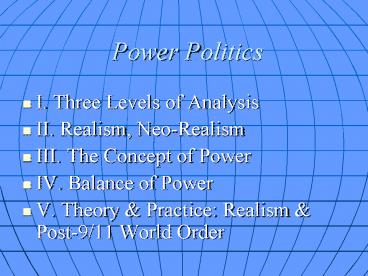Power Politics - PowerPoint PPT Presentation
1 / 28
Title: Power Politics
1
Power Politics
- I. Three Levels of Analysis
- II. Realism, Neo-Realism
- III. The Concept of Power
- IV. Balance of Power
- V. Theory Practice Realism Post-9/11 World
Order
2
Brief Overview
- Realism focuses on the shifting distribution of
power among states - Liberalism only democratic gvts are legitimate
and politically reliable - democracies dont fight each other.
- Radicalism Discontent with workings of
capitalism and dominance relations - Idealism (social constructivism) changing norms
of sovereignty, human rights and international
justice.
3
Three Levels of Analysis
- Multiplicity of Actors, influences processes
within IS - Complexity of competing explanations theories
- Categorization into different levels of analysis,
i.e. 3 sets of similar actors or processes for
possible explanations
4
Three Levels of Analysis
- - Individual decision-making
- - Nation-state (and domestic politics)
- - International environment (inter-state)
5
Individual level
- From lowest to highest
- Perceptions, choices actions of individuals
(leaders, thinkers, voters..). - Study of foreign policy psychological factors in
decision-making process
6
Domestic level
- Domestic, state or societal level aggregation of
individuals within states that influence state
actions in international system (interest groups,
government agencies,..) - Account for differences in states social,
economic or political structures
7
Interstate level
- International or systemic level the influence of
the international system upon outcomes - Interaction of states themselves
- Geographic locations, relative power positions
- Traditionally most important level of analysis
8
Realism (O)
- Reaction to idealism and unrealistic approach
to IR, i.e. failure of League to prevent WWII - Intellectual heritage Thucydides (History of
Peloponnesian War), Sun Tzu (The Art of War),
Machiavelli (the Prince) Hobbes (Leviathan)
9
Realism (O)
- Sun Tzu (500 BC)
- Thucydides, The Peloponnesian Wars (431-404 BC)
- The strong do what they have the power to do and
the weak accept what they have to accept.
10
Realism (O)
- Origins 17th c. classical realism
- Hobbes Leviathan
- Founders
- 20th c. classical realism
- Hans Morgenthau, George Kennan, Reinhold Niebuhr
- 20th c. modern realism, structural realism/
neo-realism - Kenneth Waltz, John Mearsheimer
- 20th c. rational choice realism (Krasner) and
neo-classical realism (Zakaria) - Doers Otto von Bismarck (RealPolitik), Henry
Kissinger
11
Realism (S)
- International relations is the realm of power
politics - Realism focuses on shifting distribution of power
among states - Security affairs prime
- Economic cooperation relevant if security
objectives are advanced
12
Realism (T)
- Human beings are power-seeking, aggressive and
fearful - International affairs is a struggle for power
among self-interested states - States exist in an anarchical state like the
state of war
13
Realism (T)
- Weaker states ally to protect themselves from
stronger ones - Continuous balance of power (Europe 19th c.)
14
Realism (T)
- Anarchy not complete chaos or absence of
structures and rules but lack of central
authority to enforce rules - Prudence in foreign policy is a great value
- Deep pessimism about human nature (Morgenthau)
15
Realism, Pragmatism Peace (T)
- Defensive neo-realists war can be avoided
through prudent diplomacy - Clear pragmatism about power can bring more
peaceful world
16
Realism (I)
- Counters naïve belief that international
institutions and law alone can preserve peace - I.I. are inadequate
- International Law is a tool for powerful states.
17
Neo-Realists
- Borrow Morgenthaus ideas about balance of power
states behavior - Not human nature but anarchy in the international
system no authority to protect States - Only way to provide security is through own
preparation for war
18
II. The Concept of Power
- Morgenthau all politics is a struggle for power
- Tautological uses of power
- As ability to get B to do something that B would
not otherwise do (R. Dahl, 1957).
19
Power Assets Capabilities
- Tangible Capabilities
- Geography, Military, Economic (Realists)
- Intangible
- Moral Authority
20
Capabilities Distribution of Power
- Hegemon
- Superpower
- Great power
- Middle Power
- Small power
- Important mobilization of resources
21
Sources of PowerStructural Power
- Impact on choices and outcomes by determining
structure - Agenda-setting (Bachrach Baratz, 1962)
22
Power as a RelationBargaining Power
- Party arithmetic impact on alternatives, add
issues actors - Threats, promises and constraints
- Soft Power (J. Nye)
- Coercive Diplomacy (Compellence)
- Deterrence
23
BALANCE OF POWER
- What is BoP?
- Distribution of power
- Classical balance of power
- Policy of Balancing
24
Balance of Power Stability of International
System
- WW1 Change in the distribution of power as one
of the causes of war? - Many actors and uncertainties about their
commitment to each other - Assumption major impact on great-power order
25
BoP as Distribution of Power
- 3 possibilities
- Multi-polar
- Bi-polar world
- Hegemonic system one power is militarily more
powerful - Classical balance of Power historical
multi-polar systems - Bandwagoning
- Balancing
26
European Alliance System the Hundred Years
Peace (1815-1914)
- Concert of Europe (1815-1822)
- Concert Downgraded (1822-1854)
- Concert Disintegrates (1854-1870)
- Bismarcks BoP (1870-1890)
- Rigid Alliance System (1894-1914)
- Self-adjusting balance, no major war
27
III. Challenges to Theory Post-9/11 Order
Realism
- No formal balance of power to counter US power
(Europeans and armed resistance but no military
counter-weight) - Importance of non-state actors transnational
networks, individuals operating across state
borders worldwide
28
Theory Practice Realism Post-9/11 Order
- Persistence of conflict, centrality of military
power - US response to 9/11 attack is in line with its
power - Use of power to expand domination, for security,
economic or other reasons - US targets are States (Afghanistan, Iraq)
rogue or failed states?































